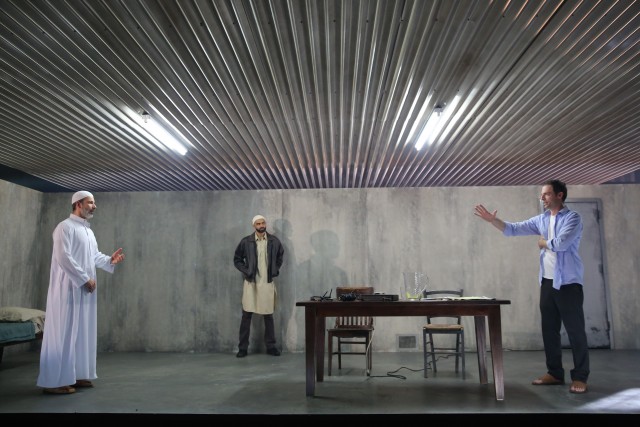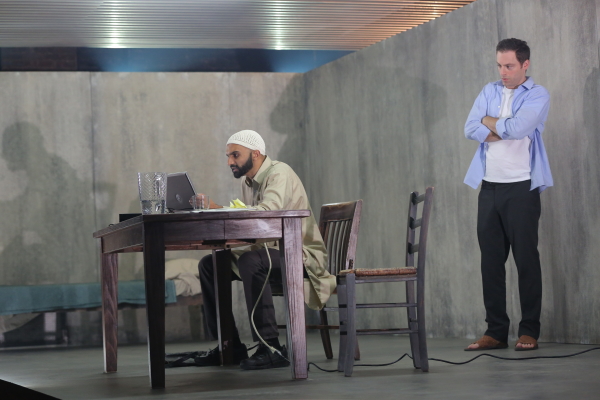
Imam Saleem (Dariush Kashani) and Bashir (Usman Ally) negotiate with Nick Bright (Justin Kirk) in the latest gripping drama from Ayad Akhtar (photo © Joan Marcus)
New York Theatre Workshop
79 East Fourth St. between Second & Third Aves.
Tuesday – Sunday through January 4, $75
www.nytw.org
www.ayadakhtar.com
In his essay “Dialogue in the Age of Industrial Storytelling: Finding Nemo, Derrida, Capitalism,” novelist and playwright Ayad Akhtar explains, “Growing capital has become our collective telos, the ultimate purpose of our body spiritual and politic; spiritual, for make no mistake, our capitalist dreams of abundance are no less the result of our desire for immortality than our erstwhile myths of paradise were. Capital must grow. The preservation of this dream of completion, the securing means by which it can be fulfilled, this is our new, our only holy devotion.” Akhtar, who won the 2013 Pulitzer Prize for Disgraced, now on Broadway in a beautiful and shattering production, explores the concepts of capitalization and holy devotion in the gripping The Invisible Hand, which continues through January 4 at New York Theatre Workshop. The second play he wrote and third to be staged in New York (The Who & the What ran at the Claire Tow this past summer), The Invisible Hand is set in Pakistan, where an American banker, Nick Bright (Justin Kirk), has been mistakenly taken hostage by a radical group led by the calm, determined Imam Saleem (Dariush Kashani) and his violent right-hand sergeant-at-arms, Bashir (Usman Ally). Bright, a family man, is guarded by Dar (Jameal Ali), who tries to treat him like a human being instead of a pawn in a fierce political battle. When the Imam sets the ransom at $10 million, Bright offers to help the group make the money through online stock trading, and as soon as they start amassing cash, their relationships — and their values — begin shifting in dramatic ways.

Bashir (Usman Ally) learns from Nick (Justin Kirk) that greed is good in THE INVISIBLE HAND (photo © Joan Marcus)
In his previous two plays, Akhtar, who has also written the 2012 novel American Dervish and cowrote and starred in the 2005 indie film The War Within, explored personal identity through the lens of race and religion. But in The Invisible Hand, he turns his attention to the corrupting influence of capitalism, depicting how even the most righteous of individuals can succumb to pure greed. The play’s masterful construction employs reversals of power, empathy, and a brief lesson on puts and calls to investigate a world of questions about human values much larger than a terrorist prison cell. The title comes from a phrase coined in 1759 by Adam Smith, who wrote that the rich “are led by an invisible hand to make nearly the same distribution of the necessaries of life, which would have been made, had the earth been divided into equal portions among all its inhabitants, and thus without intending it, without knowing it, advance the interest of the society, and afford means to the multiplication of the species.” Indeed, money in The Invisible Hand changes everything among all four characters. Kirk (Other Desert Cities, Love! Valour! Compassion!) is gritty and honest as Nick, making the audience root for the kind of man many blame for the recent economic crisis. Similarly, Ally (Elaborate Entrance of Chad Deity) and Kashani (Homebody/Kabul) are able to humanize the most villainous of men on earth, murderous terrorists, while Ali is caught somewhere in the middle, like most people across the globe just trying to get by. Director Ken Rus Schmoll (Red Dog Howls) keeps the tension high and the atmosphere claustrophobic on Riccardo Hernandez’s dank, gray set that mysteriously opens up for the second act. With The Invisible Hand, Akhtar, who was born in New York City and raised in Milwaukee, further establishes himself as an outstanding interpreter of the ills of society in the twenty-first century.